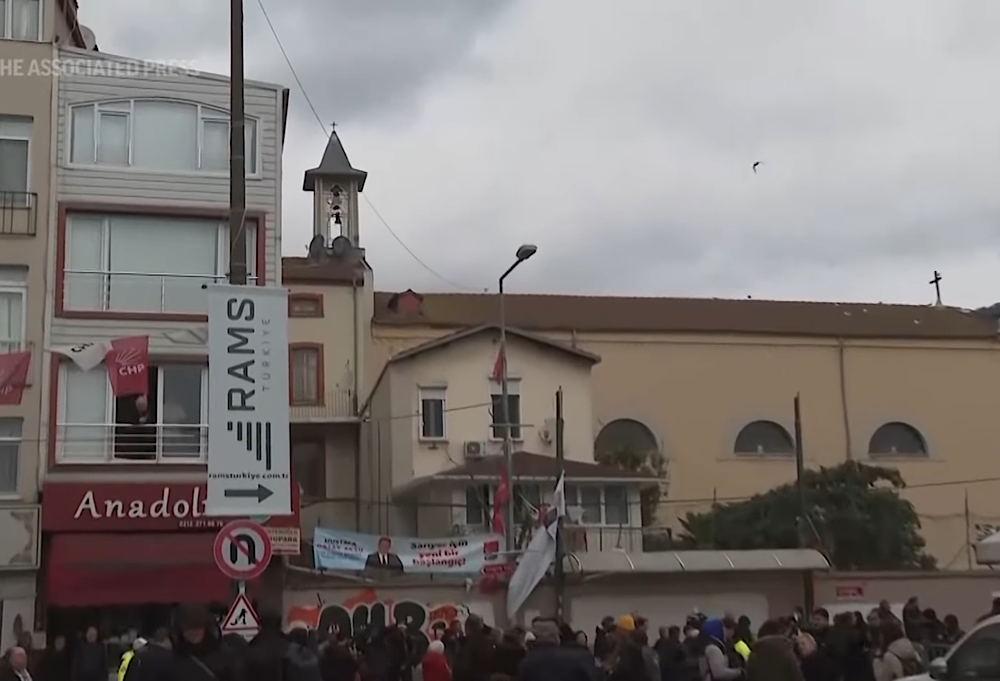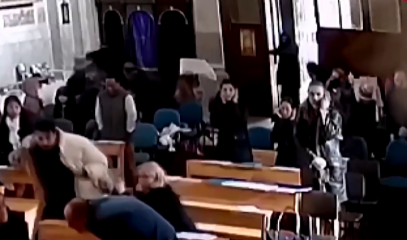Vicar of Anatolia: Gaza, migrants, and anti-Christian attacks reflect the West’s failure
Several factors explain the attack by the Islamic State against the Santa Maria Church, but the root cause is the failure to resolve the Palestinian question, which periodically inflames the region. For Bishop Bizzeti, there is a “domino” effect that stems from oversimplification and short-sighted policies. He criticises the "irresponsible" decision to halt funding to UNRWA in Gaza.
Rome (AsiaNews) – Several seemingly unrelated crises seem to be unfolding at the same time: In Istanbul, the Santa Maria Catholic Church was attacked; in Gaza, Israel is carrying out its devastating war against Hamas, stocking the flames not only in the Holy Land but across the Middle East with its burden of deaths and destruction; ships have come under attack in the Red Sea; waves of migrants have not been halted either by Western money or repressive policies.
According to Bishop Paolo Bizzeti, Apostolic Vicar of Anatolia, if all these situations are linked, they can show many of the unresolved issues that fuel the violence. For the prelate, who is currently in Italy, “It's all connected, causing a domino effect.”
“The failure to resolve the Palestinian issue allows extremist groups to periodically carry out their attacks; in the name of a common solidarity with their people, they attack wherever they can. It is no coincidence that drawings and pictures of churches and synagogues were found in the attackers’ hideout.”
The bishop here is referring to the attack on a Catholic church in Istanbul on 28 January that left a 52-year-old man dead and several more people wounded. Since then, the police have arrested 25 people and released more information about the incident.
The clothes of the two attackers were found in a rubbish bin, hastily thrown away before they fled to avoid recognition via CCTV footage. Both worked as cooks at a Chinese restaurant in the Bahçelievler district and are said to be from Russia and Tajikistan.
The police seized the weapons used in the attack, and released photos of the attackers; one of them appears to have shaved off his beard to avoid recognition, while the car used, which had a Polish licence plate, was abandoned.
The Islamic State claimed responsibility for the incident, but its modus operandi differs from how the jihadi group normally acts. The final death toll could have been far worse were it not for the gun that jammed.
The vicar of Anatolia wonders why Turkish authorities – who "had previously identified and arrested a fair number of people ready to strike" churches and synagogues – “did not think to warn us so that we could take precautions or countermeasures.”
In his view, “There was no need for great announcements," he explained; “it would have been enough to warn the bishop.” Hopefully, the attacks "are over and there are no sequels."
“In the Middle East, particularly in Turkey, there is a growing feeling of estrangement from everything related to the West, with obvious simplifications; Christians, Europeans, Americans, Westerners in general are considered as part of a whole."
Analysing the causes behind the anti-Christian attacks in Turkey, the vicar of Anatolia points the finger at the "short-sighted" policy of the United States and Europe, linked to the “deep ignorance" of Middle Eastern history.
Through “huge contracts, [and] military partnerships constantly expanded, we delude ourselves into thinking that we can control the flow of migrants," he said, "delegating the task to Ankara" in exchange for money.
Even the charges made against “President [Recep Tayyip] Erdoğan of dictatorship are a simplification", because he has been able to “give a great boost to the country and has political skills that are far greater” than those of many leaders in the Old Continent.
Proof of this are the many places, from Africa and the Balkans to Gaza, where he has proved to be a major player, far more than some Western governments.
“However, the quest for internal support is not without its problems. The two hours of religion are an introduction to a life as a practising Muslim, like catechism for Christians, while some public high schools have been turned into establishments to train imams.
“This is part of the policy of the president’s Justice and Development Party (AKP) to win over religious voters but it drives a wedge between people who are more open and tolerant in matters of religion and those who are more radical and susceptible to populism.”
Finally, the Turkish people – but more generally all the peoples of the region – "cannot fathom a Western society that denies God, even though among Turks there is a small number of atheists; for most, this is incomprehensible because it represents the loss of the signposts of life, of morality. For years, Europe was a model to aspire to at the political level, but today the appreciation for its vision of life has broken down.”
On the one hand, therefore, there is the "simplification" of the war in Gaza that does not allow us to understand that Christians are also victims of a Western policy that is often "too one-sided towards Israel” with serious consequences.
“Not only the Palestinians, but also Israel’s Bedouin communities, who are targeted by the settlers and who in 40 years have gone from 500,000 to about 30,000."
“No one talks about them, yet this is also a genocide" that contributes "to inflaming the Middle East;” on the other hand, a part of the Muslim world shows just as much simplification by attacking Christians as a “symbol” in a “broad climate of [hatred] that has been growing since the two Gulf Wars.”
With respect to the attack on the church in Istanbul, it could be “a minor episode, but in reality, it is a mirror of a policy that does not work and for which we all share responsibility, from Turkey to Europe and the United States, as evinced by the latest irresponsible decision to halt aid to Gaza through UNRWA.”
26/10/2023 20:16
29/01/2024 13:09
03/04/2023 16:00
11/08/2017 20:05








.png)










